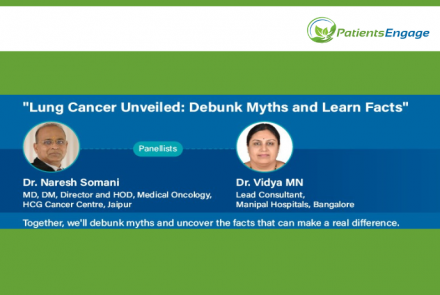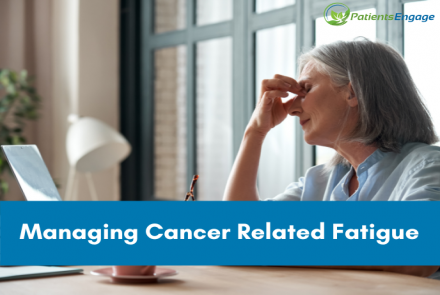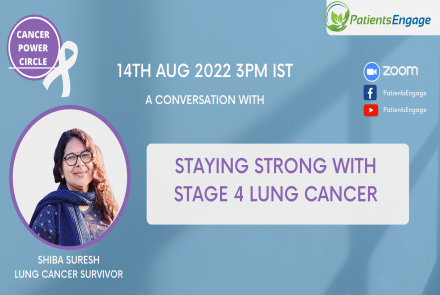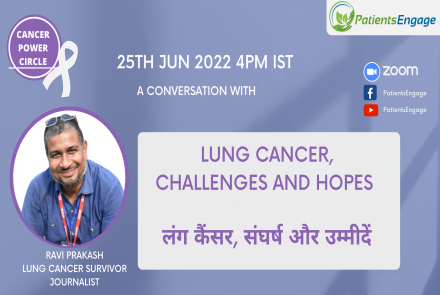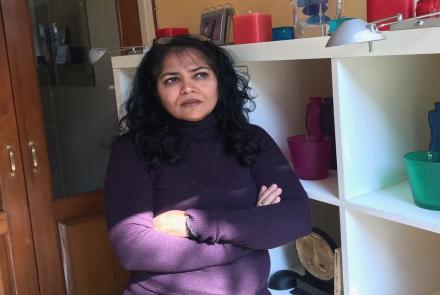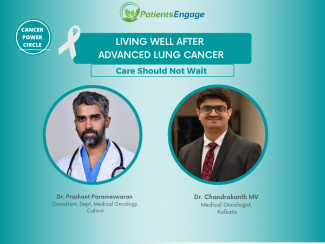
Dr. Prashant Parmeswaran (Consultant Department medical oncology MVR cancer center and Research Institute Calicut) & Dr. Chandrakanth MV (medical oncologist at Narayan super Specialty Hospital Kolkata) talk about signs, symptoms, early diagnosis and how to live well after advanced lung cancer.
PatientsEngage conducted a series for lung cancer awareness on various topics such as signs, symptoms, early diagnosis and risks associated with lung cancer. This article helps us understand how to live well with advanced lung cancer.
Why does lung cancer tend to get diagnosed at a late stage? Why do most patients end up being diagnosed at a late stage?
In the early stages, lung cancer is often asymptomatic, so it is difficult to diagnose. Respiratory symptoms like cough and breathlessness can also be caused by other conditions, such as infections or tuberculosis. Lung cancer is less common than these other causes, so it is often not initially considered. Patients may have received treatment for tuberculosis before being diagnosed with lung cancer. Lack of awareness and suspicion levels contribute to late diagnosis. Treatment for lung cancer is less effective in advanced stages. This is a challenge in community practice.
What are the treatment options for lung cancer, both in early stages and in advanced stages?
Lung cancer is divided into four stages: stage one to stage four. Majority of patients are still diagnosed in stage four. PET CT Scan is used for diagnosis.
- In stage one and early detection of stage two, surgery is typically performed followed by chemotherapy or targeted therapy.
- Locally advanced disease (stage three) may be treated with radiotherapy or chemotherapy.
- In advanced stage (stage four), treatment options include chemotherapy, targeted therapy, and immunotherapy.
There has been significant progress in the treatment of lung cancer, with some patients achieving five-year survival. However, the majority of patients still present with stage four lung cancer.
Can patients with lung cancer go into remission or is it managed as a chronic condition? Does the prognosis differ based on the stages or types of lung cancer?
Lung cancer is divided into non-small cell lung cancer (85% of cases) and small cell lung cancer. Small cell lung cancer is different and treated differently, usually not operable. Whereas, non-small cell lung cancer can be adenocarcinoma or squamous cell carcinoma, depending on the type of cells involved.
- Staging is important to determine the extent of spread, which is done through CT scans and lymph node involvement. Endobronchial ultra sound or a mediastinoscope is used to check the lymph node involvement.
- Patients diagnosed with Stage 1 and 2 lung cancer have a higher chance of cure (8 out of 10 patients). Whereas Stage 3 involves lymph nodes and the prognosis depends on the number of lymph nodes involved. Stage 4 indicates advanced disease, with spread beyond the chest or involvement of both lungs.
- Treatment success and prognosis depend on the extent of spread and stage of cancer.
What are the treatment options for patient diagnosed with advanced lung cancer and role of genetic mutation?
Treatment for advanced lung cancer involves a combination of different medications depending on individual patient factors.
In advanced stage (stage four) lung cancer, the main goal of treatment is to control the disease. Surgery and radiation are not viable options in advanced stage.
Treatment options include chemotherapy, immunotherapy, and targeted therapy. Targeted therapy is based on genetic mutations found in the lung cancer cells. Molecular studies are done on biopsy tissue to identify potential genetic mutations. If a genetic mutation is identified, targeted therapy with specific tablets can be used.
Immunotherapy which relies on injections to stimulate the immune system's response against cancer cells. However, there is no definitive biomarker for immunotherapy response, and research is ongoing in that field.
What is the quality of life for patients diagnosed with targeted therapy mutations in advanced lung cancer? Can they continue working and manage side effects?
Lung cancer is not a homogeneous disease, and the behavior and treatment options vary among different individuals. Young, non-smoking patients with specific genetic mutations may have a better prognosis and response to targeted therapy.
- Genetic testing is done on tumor tissue to identify targetable mutations.
- Targeted therapy involves taking oral tablets that specifically target cancer cells.
- Patients with targeted mutations can have excellent outcomes and good quality of life, similar to managing chronic diseases like diabetes or hypertension.
- Targeted therapy has minimal side effects compared to chemotherapy and allows patients to continue working and lead normal lives. The response to targeted therapy is usually remarkable, and it's often difficult to recognize that these patients are undergoing treatment.
- The advancements in targeted therapy have transformed the outlook for lung cancer patients, offering hope and the potential for a normal life. Personal experiences of treating lung cancer have shown a shift from a time when there was little that could be done to now having numerous treatment options and a positive attitude for patients.
What role does nutrition and exercise play for patients on targeted therapy for lung cancer?
Nutrition during treatment is crucial to prevent weight loss. Patients are advised to focus on eating well, including a higher intake of protein. There are no specific dietary restrictions, and patients can eat any type of food as long as it is fresh.
- The quantity of food may be decreased, but the frequency of meals should be increased to maintain weight. Exercise is an important aspect of maintaining overall well-being during lung cancer treatment.
- There are no contraindications for exercise, and daily walks or light physical exertion can be beneficial. Exercise not only helps maintain physical health but also contributes to mental peace and overall psychological well-being. It is important to recognize the value of exercise.
What are the psychological and emotional support needs for patients and families dealing with lung cancer? What can families do themselves, and what is needed from society to support these patients?
- Psychological and emotional support plays a crucial role in the well-being of lung cancer patients and their families. By addressing the psychological and emotional needs of patients and families, compliance with treatment and overall well-being can be improved
- Early palliative care, which involves compassionate support and addressing symptoms and concerns, improves both the quality of life and lifespan of patients.
- Spending time listening to patients and understanding their needs is more effective in improving outcomes and quality of life than any treatment alone.
- Improving the patient's well-being and managing symptoms can be more impactful than the use of advanced therapies.
- Immunotherapy, for example, works on strengthening immunity, which is also influenced by a proper mindset and stress relief.
- Supporting patients and their families helps alleviate the distress experienced by relatives, who may be burdened with financial, emotional, and practical concerns.
- Multi-disciplinary care and a holistic approach that considers the well-being of both the patient and their family members are essential.
- Society should recognize the importance of compassion, empathy, and psychological support in cancer care and provide resources and programs to meet these needs.
Final message by Dr. Prashant -
Having a cancer is not within our control, but the research and advancements in treatment offer hope for both early and advanced stage lung cancer. The goal is to manage cancer as a chronic disease, allowing patients to live many years with good quality of life. While challenges remain, we should not lose hope. The question now is when, not if, we will achieve this goal.
Final message by Dr. Chandrakant -
“Never shy away from biopsy”
It is important to be aware of the warning signs of cancer and seek medical attention if you experience persistent cough, blood in sputum, unintentional weight loss, or hoarseness of voice, especially if you have a history of smoking. Do not fear biopsies as they are necessary to diagnose cancer and are not the cause of cancer spreading. Biopsies are a standard procedure and there are safe and effective techniques available. Liquid biopsies may complement tissue biopsies, but they are not a substitute. It is crucial to prioritize your health and seek appropriate medical care when needed.
Conclusion by Moderator -
There is hope and many treatment options available for lung cancer. It is important to follow recommended tests and not fear biopsies, as they are essential for diagnosis and treatment planning. Delay in diagnosis can worsen the outcome. Additionally, nutrition and exercise play a significant role in overall well-being, and discussions with doctors about palliative and supportive care are crucial. Palliative care is not just end-of-life care, but a comprehensive approach to holistic care.
Remember, there is support available, and together we can navigate the journey of lung cancer treatment.




